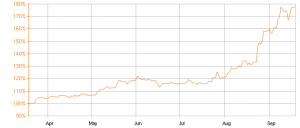VILNIUS — The Baltics are seeing a powerful rebound in equity values as investors pour back into their markets, statistics from the NASDAQ OMX Baltic stock exchange show, but economists say this won’t mean much to the overall economy.
“It has a positive effect on expectation. The driver of the recession is expectations from people and business, but I don’t think these numbers are significant in real terms – no one will become very rich. It will just create a better mood. For some companies this will bring better results, but this is more psychological,” SEB Bank economist Vilija Tauraitė told Baltic Reports.
A recent Nordea Bank market analysis report seconded Tauraitė’s view that recovery for the three Baltic states was not approaching
“The rest of the year will remain fragile,” it reads. “The recovery in domestic demand will be delayed.”
Worst economies, best stock markets
The OMX Baltic benchmark, the main measure of the three markets, has gained nearly 80 percent in the past six months. This ranks the three Baltic exchanges as among the best-performing markets in the world this year.
A NASDAQ OMX spokesperson told Baltic Reports that foreign investment into the region had kickstarted a domestic response.
The Vilnius Stock Exchange index has more than doubled in value since March this year, with Riga up 72 percent and Tallinn 62 percent over the same period.
Investor confidence is increasing even though the countries are experiencing Europe’s worst recessions.
“We see stabilization in economic trends. We guess that the retail and industry trades are bottoming out and will improve soon. Risk taking is becoming more popular,” Tauraitė said.
Tauraitė went on to say that the figures show that companies and investors had gotten over the initial shock of the recession and are now more confident and willing to invest.
“In general the first half of the year was the most uncertain and difficult for the whole economy. There was huge recession in the first three months and no one knew where and how deep the recession would be. After the first results came, companies recovered after the first shock,” she said.
Though the OMX Baltic benchmark is 60 percent down from its highest peak in February 2007 and a quarter lower than one year ago, investors who entered the market before EU accession could still be 7 percent in the black.
Swedbank analyst Marko Daljajev told the Financial Times that the figures had been driven by domestic investors.
Recently TeliaSonera, the Nordic communications giant offered to buy out minority shareholders at a premium, highlighting the effect of the deflated market.













